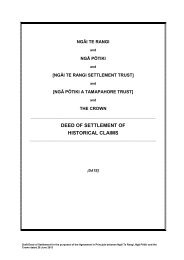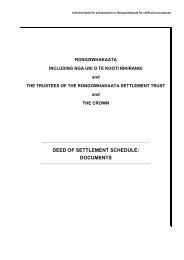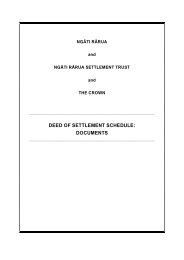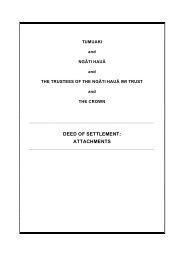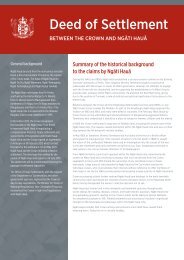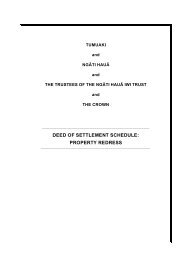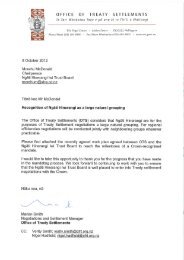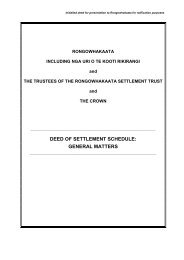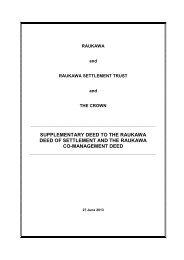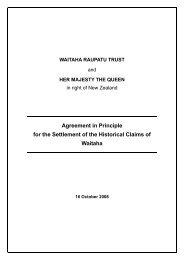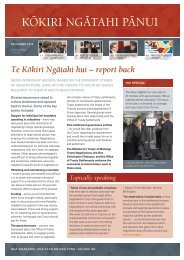Ngati Haua Deed of Settlement - Terabyte Interactive
Ngati Haua Deed of Settlement - Terabyte Interactive
Ngati Haua Deed of Settlement - Terabyte Interactive
You also want an ePaper? Increase the reach of your titles
YUMPU automatically turns print PDFs into web optimized ePapers that Google loves.
NGĀTI HAUĀ DEED OF SETTLEMENT2: HISTORICAL ACCOUNT2.16 In 1863 large crops <strong>of</strong> wheat were also being cultivated at the Ngāti Hauā settlement <strong>of</strong>Tamahere. Ngāti Hauā also grazed cattle, horses, and sheep over the surroundingHorotiu plains.EMERGENCE OF THE KIINGITANGA2.17 The New Zealand Constitution Act passed by the British Parliament in 1852 providedNew Zealand with a system <strong>of</strong> representative government. The vote was given to allmen over 21 years <strong>of</strong> age who owned or rented property <strong>of</strong> a certain minimum valuewhich was held under a Crown title. However, because most Māori land at this timewas in customary tenure, in practice relatively few Māori men were eligible to vote forthe General Assembly that first met in 1854. Although section 71 <strong>of</strong> the New ZealandConstitution Act provided a mechanism for districts to be proclaimed, within whichMāori custom and law could be given a level <strong>of</strong> <strong>of</strong>ficial recognition, this provision wasnever used, despite repeated requests from Māori for this.2.18 The idea <strong>of</strong> a Māori King was discussed at many hui in the North Island during the early1850s. Wiremu Tamehana soon became convinced <strong>of</strong> the need for change. Inparticular, he wanted Māori to have a dominant voice in the development andimplementation <strong>of</strong> policies for the governance <strong>of</strong> their own communities and controlover the provision <strong>of</strong> land to European settlers. Tamehana’s efforts to engage with theCrown on issues <strong>of</strong> Māori governance left him dissatisfied. Having been rebuffed by aCrown <strong>of</strong>ficial on a trip to Auckland to see the governor, the rangatira subsequentlydeclared “We [Māori] are treated as dogs - I will not go again.”2.19 In 1857 Wiremu Tamehana was instrumental in establishing Pōtatau Te Wherowheroas the first Māori King. On 21 February 1857, Tamehana sent a letter to all <strong>of</strong> theWaikato tribes announcing ‘the agreement <strong>of</strong> <strong>Ngati</strong>haua for Potatau to be King <strong>of</strong> NewZealand.’2.20 In May 1857 a meeting <strong>of</strong> Waikato tribes was held at Paetai, near Rangiriri. Overseveral days, supporters and opponents <strong>of</strong> the King movement debated its merits.Wiremu Tamehana argued a King would be better able to provide order and laws thanthe Governor, who he considered intervened when Europeans were involved but didnothing to resolve conflict between Māori. Paora Te Ahura <strong>of</strong> Ngāti Hauā also felt theGovernor had been ineffective in providing order. He did not see why Māori should nothave their own King and he did not see the King as standing in opposition to theQueen. “Why should the Queen be angry? We shall be in alliance with her, andfriendship will be preserved.”2.21 Wiremu Tamehana’s instrumental role in the establishment <strong>of</strong> the Kīngitanga saw himdubbed as ‘the King maker’ in some European circles. Ngāti Hauā use the termTangata Whakawahi Kīngi. In his role as Tangata Whakawahi Kīngi, WiremuTamehana placed a Bible on the head <strong>of</strong> Pōtatau, recited scripture and anointed him asKing. The role <strong>of</strong> Tangata Whakawahi Kīngi later passed down to Wiremu Tamehana’sson, Tupu Taingakawa, who also became Tumuaki <strong>of</strong> the Kīngitanga. Ngāti Hauāconsider that the hereditary Tumuaki position, encompassing the role <strong>of</strong> TangataWhakawahi Kīngi, continues to be passed down through the descendants <strong>of</strong> WiremuTamehana today. Ngāti Hauā maintain that the Tumuakitanga forms an essential part<strong>of</strong> the Kīngitanga, as without the Tumuaki there would be no King.REACTIONS TO THE KĪNGITANGA2.22 The Kīngitanga initially drew a range <strong>of</strong> reactions and responses from Europeans .Some politicians and <strong>of</strong>ficials urged the Governor to recognise the King movement12



